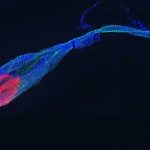Link to Pubmed [PMID] – 15550379
J. Biol. Chem. 2005 Feb;280(5):3838-46
A class of amino acid substitutions in drug-resistant HIV-1 reverse transcriptase (RT) is responsible for the selectively impaired incorporation of the nucleotide analog inhibitor into DNA. We have shown previously that alpha-boranophosphate nucleoside analogs suppress RT-mediated resistance when the catalytic rate is responsible for drug resistance such as in the case of K65R and dideoxy (dd)NTPs, and Q151M toward AZTTP and ddNTPs. Here, we extend this property to BH3-d4TTP and BH3-3TCTP toward their clinically relevant mutants Q151M and M184V, respectively. Pre-steady-state kinetics on mutants of the Q151M RT family reveal a 3-5-fold resistance to d4TTP. This resistance is suppressed using BH3-d4TTP. Likewise, resistance to 3TCTP by M184V RT (30-fold) and K65R/M184V RT (180-fold) is suppressed using BH3-3TCTP because of a 160-fold acceleration of the catalytic constant kpol. Mechanistic insights into the rate enhancement were obtained using various alpha-boranophosphate nucleotides. The presence of the BH3 group renders kpol independent of amino acid substitutions present in RT. Indeed, the approximately 100-fold decrease in polymerase activity caused by the R72A substitution is restored to wild-type levels using BH3-dTTP. Metal ion titration studies show that alpha-boranophosphate nucleoside analogs enhance 3-8-fold the binding of Mg2+ ions to the active site of the RT.DNA.dNTP complex and alleviate the requirement of critical amino acids involved in phosphodiester bond formation. To our knowledge, this is the first example of rescue of polymerase activity by means of a nucleotide analog.

